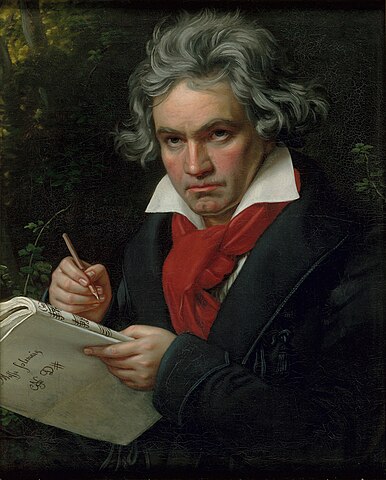More languages
More actions
Jucheguevara (talk | contribs) (created page) Tag: Visual edit |
General-KJ (talk | contribs) (Added Infobox) Tag: Visual edit |
||
| Line 1: | Line 1: | ||
{{Infobox person|name=Ludwig van Beethoven|birth_place=Bonn, [[Electorate of Cologne]], [[Holy Roman Empire]]|birth_date=17 December 1770 (baptism)|death_date=26 March 1827 (aged 56)|death_place=Vienna, [[Austrian Empire]]|known=Classical composer|nationality=German|image=Joseph Karl Stieler's Beethoven mit dem Manuskript der Missa solemnis.jpg}} | |||
He wanted to create a symphony based on the Napoleon's career entitled "Bonaparte" to celebrate the idea of a heroic revolutionary leader, but he became disillusioned when Napoleon declared himself Emperor in 1804.<ref>Kerman, Joseph; Tyson, Alan; Burnham, Scott G. (2001). "Ludwig van Beethoven". Oxford Music Online. [https://www.oxfordmusiconline.com/grovemusic/view/10.1093/gmo/9781561592630.001.0001/omo-9781561592630-e-0000040026#omo-9781561592630-e-0000040026 doi:10.1093/gmo/9781561592630.article.40026]</ref> | '''Ludwig van Beethoven''' was a [[Holy Roman Empire (800–1806)|German]] composer and pianist. His music was subversive and passionately democratic, in favor of [[republicanism]] and in opposition to the feudal order.<ref>{{News citation|journalist=Chris Wright|date=2020-10-25|title=The Revolutionary Beethoven|url=https://www.dissentmagazine.org/online_articles/the-revolutionary-beethoven|newspaper=[[Dissent Magazine]]|archive-url=https://web.archive.org/web/20210716011303/https://www.dissentmagazine.org/online_articles/the-revolutionary-beethoven}}</ref><ref>{{News citation|journalist=Alan Woods|date=2020-12-17|title=Beethoven: man, composer and revolutionary|url=https://www.marxist.com/beethoven-man-composer-revolutionary190506.htm|newspaper=[[In Defense of Marxism]]}}</ref> | ||
He wanted to create a symphony based on the [[Napoleon Bonaparte|Napoleon]]'s career entitled "Bonaparte" to celebrate the idea of a heroic revolutionary leader, but he became disillusioned when Napoleon declared himself Emperor in 1804.<ref>Kerman, Joseph; Tyson, Alan; Burnham, Scott G. (2001). "Ludwig van Beethoven". Oxford Music Online. [https://www.oxfordmusiconline.com/grovemusic/view/10.1093/gmo/9781561592630.001.0001/omo-9781561592630-e-0000040026#omo-9781561592630-e-0000040026 doi:10.1093/gmo/9781561592630.article.40026]</ref> | |||
== References == | == References == | ||
<references /> | |||
[[Category:Composers]] | |||
[[Category:German composers]] | |||
Latest revision as of 10:57, 10 October 2024
Ludwig van Beethoven | |
|---|---|
 | |
| Born | 17 December 1770 (baptism) Bonn, Electorate of Cologne, Holy Roman Empire |
| Died | 26 March 1827 (aged 56) Vienna, Austrian Empire |
| Nationality | German |
| Known for | Classical composer |
Ludwig van Beethoven was a German composer and pianist. His music was subversive and passionately democratic, in favor of republicanism and in opposition to the feudal order.[1][2]
He wanted to create a symphony based on the Napoleon's career entitled "Bonaparte" to celebrate the idea of a heroic revolutionary leader, but he became disillusioned when Napoleon declared himself Emperor in 1804.[3]
References[edit | edit source]
- ↑ Chris Wright (2020-10-25). "The Revolutionary Beethoven" Dissent Magazine. Archived from the original.
- ↑ Alan Woods (2020-12-17). "Beethoven: man, composer and revolutionary" In Defense of Marxism.
- ↑ Kerman, Joseph; Tyson, Alan; Burnham, Scott G. (2001). "Ludwig van Beethoven". Oxford Music Online. doi:10.1093/gmo/9781561592630.article.40026
